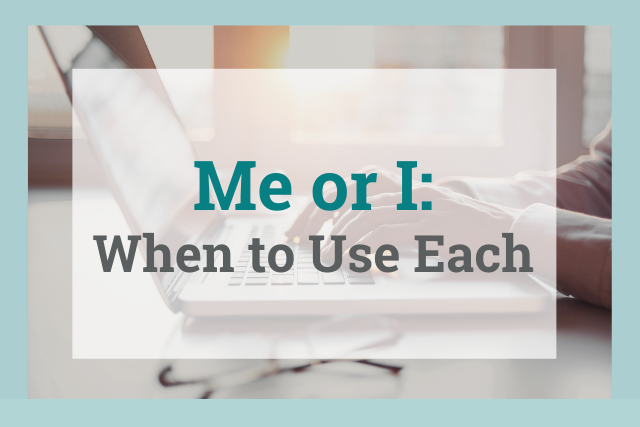
The English language is full of grammar rules. It can be pretty easy to forget some of them. Understanding the difference in how to use personal pronouns is a good place to start if you want to improve the readability of your work.
In this article, we'll look at whether to choose "I" or "me" so all your sentences can be clear.
But let's start with a little ground work.
"When Should I Use "I" or "Me"?"
"I" and "me" are first-person personal pronouns that we use to refer to ourselves.
A personal pronoun is a word used as a substitute for someone's name.
Simply put, this means you should use "I" or "me" in a sentence as a substitute for your name when you are talking about yourself.
Here are some examples:
Correct: I am feeling happy today.
Incorrect: [Your name] am feeling happy today.
Correct: That sounds good to me!
Incorrect: That sounds good to [your name]!
But how do you know whether to use "me" or "I" when you're referring to yourself? It's all to do with your role in the sentence.
What Is a Personal Pronoun?
Before we jump in to "I" vs. "Me", let's take a quick look at what personal pronouns are and what they do in sentences.
Personal pronouns are short words used in place of the name of a person or thing. They include:
- I
- Me
- You
- We
- Us
- He
- She
- Him
- Her
- They
- Them
- It
So instead of this repetitive sentence:
Sarah drove Sarah's car to Sarah's house.
We can write:
Sarah drove her car to her house.
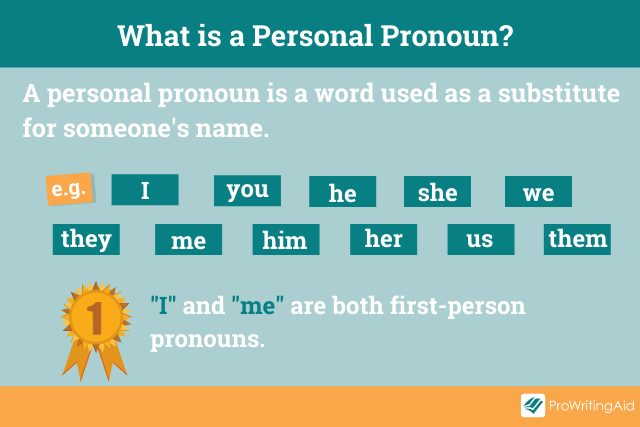
How Do I Use "Me" and "I" in a Sentence?
Every word has a function in a sentence. There are many different functions, but "I" and "me" each only have one.
- "I" is always the subject of the sentence: the person or thing doing the action.
e.g. I passed the note to Elena.
You are the one doing the passing (completing the action), so you use "I".
- "Me" is always the object of the sentence: the person or thing the action is being done to.
e.g. Elena passed me a note.
You are having something passed to you (the object of the action), so you use "Me".
So, your first step when choosing whether to use "I" or "me" is to work out if you are doing the action or being acted on.
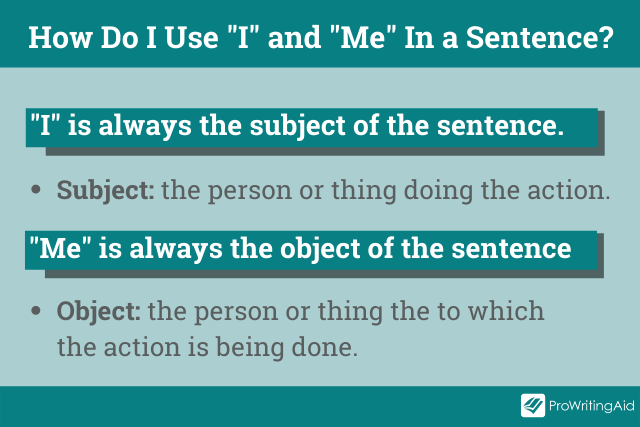
Is It Jane and Me or Jane and I?
The subject/object rules from above still apply, even when you are referring to multiple people.
If you want to refer to yourself and another person (or several other people) as the subject(s) of the sentence—the people completing an action—you should use "I". It gets easier with examples:
Correct: Jane and I went to the store to get more groceries.
Both you and Jane are completing the action here—you are the subjects of the sentence. So, like before, you refer to yourself with "I".
Incorrect: Jane and me went to the store to get more groceries.
But if you want to refer to yourself and another person (or several other people) as the object(s) of the sentence—the people being acted on—you should use "me".
Correct: Claire served the meal to Sophie and me.
Claire is the subject of this sentence (the one completing the action) and you and Sophie are the indirect objects (the ones receiving Claire's action). So you should use "me".
Incorrect: Claire served the meal to Sophie and I.
Is it "John and I" or "I and John"?
The next thing to remember, is that "I" always comes last with multiple subjects. (It's "John and I", not "I and John".)
Correct: John and I went to the store.
Incorrect: I and John went to the store.
You should still use "I" (and "I" still always comes last in the sequence), even if there is more than one other subject:
- Correct: Jane, John, and I went to the store to get more dog food.
- Incorrect: I, Jane, and John went to the store to get more dog food.
- Incorrect: Jane, John, and me went to the store to get more dog food.
- Incorrect: Me, Jane, and John went to the store to get more dog food.

Is it "John and Me" or "Me and John"?
The same rules apply to sequencing when "me" is the object of a sentence. So, "me" always comes last with multiple objects.
- Correct: Clarissa cooked dinner for John and me.
- Incorrect: Clarissa cooked dinner for me and John.
- Incorrect: Clarrisa cooked dinner for John and I.
- Incorrect: Clarrisa cooked dinner for I and John.
Even with multiple people as the sentence object, "me" still comes last in the sequence.
Correct: Clarrisa cooked dinner for Oscar, John, and me.
Incorrect: Clarissa cooked dinner for me, Oscar, and John.
Incorrect: Clarrisa cooked dinner for I, Oscar, and John.
Incorrect: Clarissa cooked dinner for Oscar, John, and I.
How Do I Remember When To Use "I" and "Me"?
If you are a native English speaker, you can use your ear to help you figure out which is the right pronoun in cases of multiple persons.
When determining the subject, leave out the other people to help you figure out which is correct:
- Correct: I went to the store...
- Incorrect: Me went to the store...
Likewise, when determining the object, leave out the other people:
- Correct: Clarissa cooked dinner for me...
- Incorrect: Clarissa cooked dinner for I...
Do I Use "I" After or Before a Verb?
"I" is used before the verb, while "me" is almost always used after the verb.
There are a few instances where "I" comes after the verb. This happens with verbs such as:
- am
- are
- is
- was
- were
- appeared
- seemed
Correct: It is I who needs the extra water.
Incorrect: It is me who needs the extra water.
Correct: It seems I am to blame.
Incorrect: It seems me am to blame.
Can I Use "Me" Instead of "I" in Speech?
Common speech can sound right to the ear, even when the grammar is wrong. In certain cases, you may want to save the correct pronoun for writing. The best example is the answer to the question, Who is it?
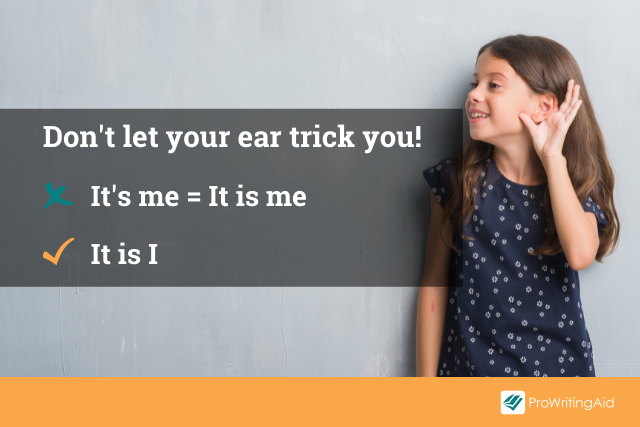
In common speech, we often hear It's me (It is me) and think nothing of hearing that.
But correct grammar with the state-of-being verb is takes the subject pronoun. In writing with correct grammar, you say, It is I.
Your friends may think your language is a bit stiff if you use correct grammar in everyday speech, but at least you'll be correct.
We know this a lot to take in all at once. And while you can always bookmark this article as a good reference point, that's not the only resource you have.
ProWritingAid has over 20 reports, with the grammar checker being your go to to see if you're using the right pronoun. You'll see a notice with suggestions if your pronoun use needs improvement.
Download our free browser extension to make sure you use the correct pronoun wherever you write.
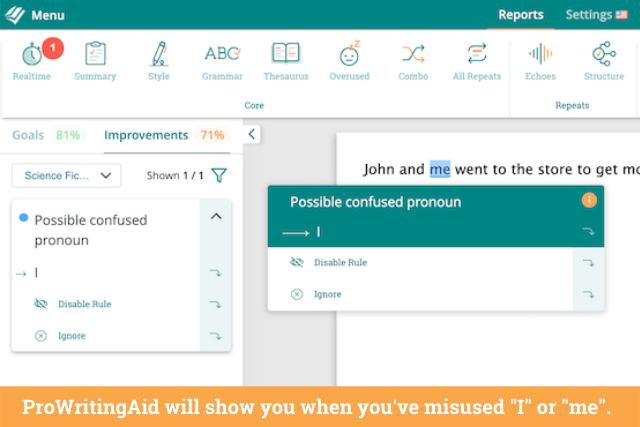
Is It "Between You and Me" or "Between You and I"?
It's between you and me. That's because "you" and "me" are the objects of the word "between" in this phrase.
Between is a preposition. If you are referring to yourself after a preposition, you should always use me. Here are some common prepositions to help you out:
- above
- across
- against
- along
- among
- around
- at
- before
- behind
- below
- beneath
- beside
- between
- by
- down
- from
- in
- into
- near
- of
- off
- on
- to
- toward
- under
- upon
- with
- within
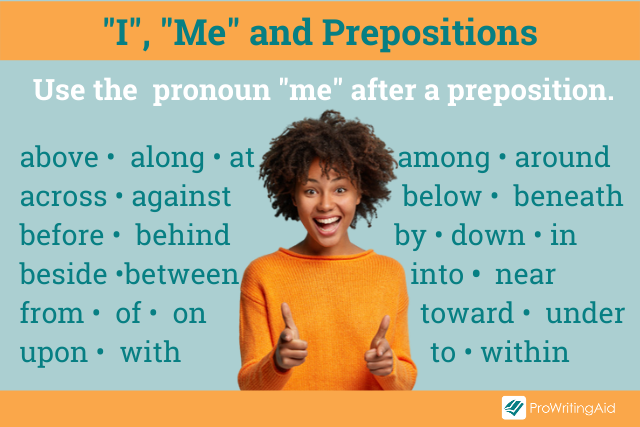
Here are some examples to help you with "me" as the object of a preposition:
Correct: The spelling competition was now between Jim and me.
Incorrect: The spelling competition was now between Jim and I.
Correct: The association letter about the new AED (automated external defibrillator) in the clubhouse was from Marcia and me.
Incorrect: The association letter about the new AED (automated external defibrillator) in the clubhouse was from Marcia and I.
Correct: When the instructor asked answers from the break-out groups, my group with Jerry, Linda, George, and me had the best answers.
Incorrect: When the instructor asked answers from the break-out groups, my group with Jerry, Linda, George, and I had the best answers.
Is It "Taller Than Me" or "Taller Than I"?
One place where "me" and "I" are often confused is in comparisons. That's usually because a verb is left off the end of the sentence.
Here's an example:
- Correct: John is taller than I am.
In speech you might say:
- John is taller than I.
While the verb am is left out of the sentence, it's still grammatically correct.
Incorrect: John is taller than me.
Correct: I think she is smarter than I am.
Incorrect: I think she is smarter than me.
Master First-Person Personal Pronouns
Remember: The easiest way to remember the difference between "me" and "I" in writing is to work out if you are completing or receiving the action in the sentence.
- Use "I" for the sentence subject taking the action.
- Use "me" as the object of a sentence (or after a preposition).
That was a lot of grammar rules. Now have some fun with Me, Myself, and I from De La Soul.


